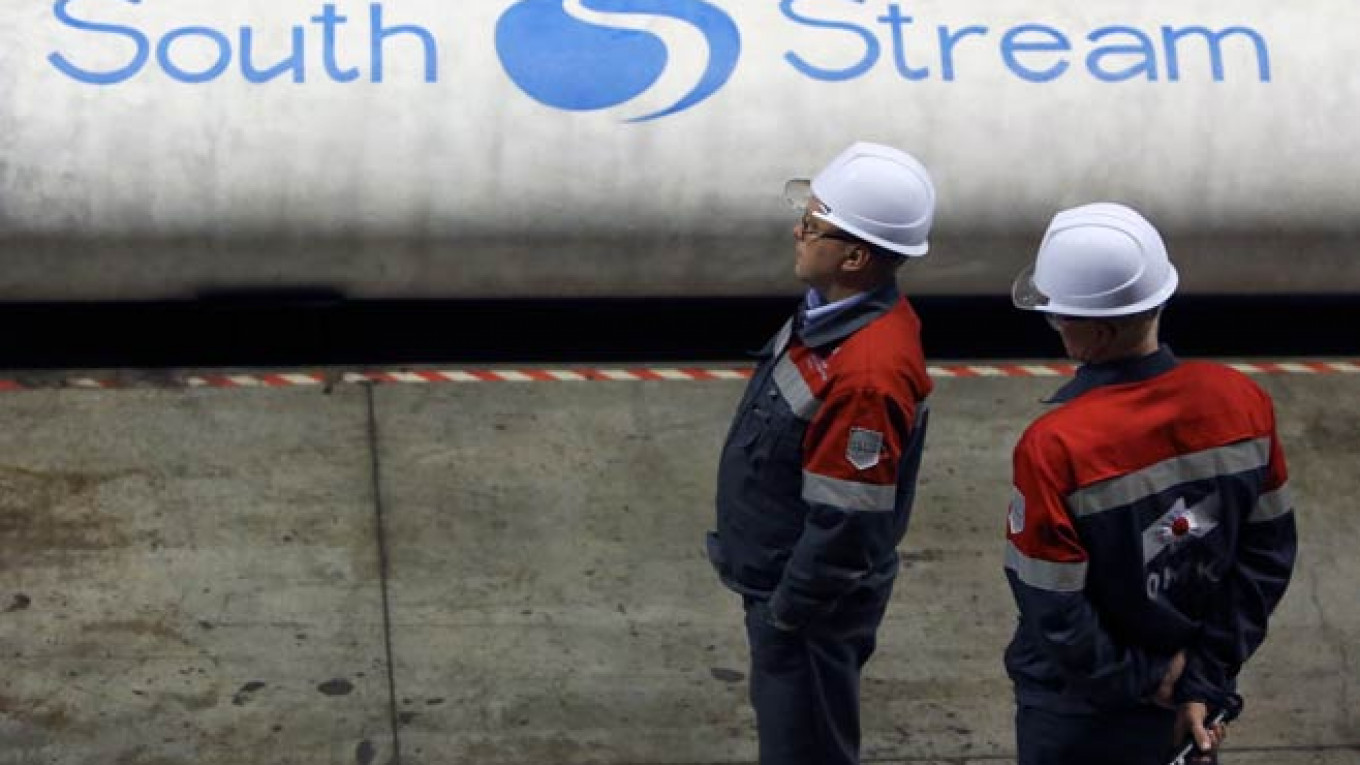Gazprom has abandoned plans to build a section of its disputed South Stream gas pipeline to Italy, two sources close to the company said on Wednesday, a day after Gazprom announced a deal with petroleum giant OMV to build a branch to Austria.
The memorandum of understanding with the Austrian oil and gas company foresees building a section of the giant pipeline from Hungary to OMV's Central European Gas Hub near Vienna.
"The additional Italian spur option was effectively ditched. Gas will now be delivered to the Austrian hub, from where it could go to many destinations in Europe along the existing pipelines," one of the sources said.
"Without the Italian spur, the project's costs will drop by as much as $1 billion."
Gazprom is pushing ahead with South Stream, whose total construction costs are estimated at $40 billion, despite Western sanctions against Russia over the crisis in Ukraine.
Neither Gazprom nor its chief executive, Alexei Miller, a long-standing ally of Russian President Vladimir Putin, have been targeted by the sanctions.
Italy signalled on Wednesday it still supported the South Stream project. "The project is not frozen," a government spokesman told Reuters, denying an earlier report.
Earlier on Wednesday, a government source said the project had effectively been put on ice, adding that Rome would focus on the Trans Adriatic Pipeline, or TAP, which will transport Azeri gas, and the ITGI Interconnector pipeline through Turkey and Greece into Italy.
The South Stream's proposed 2,500 km (1,500) route stretches from Russia under the Black Sea through Bulgaria and Serbia to Hungary and now Austria. It bypasses Ukraine, through which almost half the gas Europe buys from Russia currently passes.
Europe is worried about its dependence on Russian gas, which accounts for a third of EU imports, particularly after Russian-Ukrainian gas disputes in 2005 and 2009 led to supply disruptions. But the bloc has yet to come up with a realistic alternative.
The European Commission, the EU's executive arm, says South Stream does not comply with its regulations on ownership and pipeline access and put the approval process on hold following Russia's annexation of Crimea in March.
A commission spokeswoman on Wednesday said she could not comment on the proposed route of South Stream.
Some European leaders see South Stream as a solution to avoid future potential supply disruptions.
Italy's Eni is one of Gazprom's partners for the offshore part of South Stream, along with Germany's Wintershall and France's EDF.
Eni Chief Executive Paolo Scaroni said last month the project's future had been called into question by the escalating dispute over Ukraine, which could complicate an already complex permitting process in the different transit countries.
Efficient Option
Gazprom and OMV said Tuesday they would rely on a 2010 intergovernmental agreement between Russia and Austria as the legal basis for their deal.
South Stream is designed to have a total capacity of 63 billion cubic metres per year, enough to meet about 13 percent of EU gas consumption, and the Austrian section would have half that capacity, OMV and Gazprom said.
Some of the gas from Russia could flow to markets such as Turkey, Bulgaria or Hungary before reaching the Austrian border.
Bringing South Stream to Austria would be a bittersweet victory for OMV. In a contest to bring Azeri gas to Europe, OMV's Nabucco consortium lost out to the rival TAP, which ends in southern Italy.
EU support for Nabucco West faded as South Stream, with its similar route through central Europe, moved closer to reality.
South Stream is also a potential way for OMV to import gas from any future Black Sea discoveries of its own, which it says may prove to be its biggest ever.
Following the selection of TAP as the pipeline for Azeri gas, the need for a second major pipeline such as South Stream to deliver gas to Italy, an already oversupplied and depressed market, has decreased.
"One of the main reasons (for switching the end point to Austria) was the fact that consumption in Italy has fallen significantly compared to the years when the project was first designed," the Gazprom source said. "Delivering gas to the Austrian hub is a very efficient option."
See related stories:
A Message from The Moscow Times:
Dear readers,
We are facing unprecedented challenges. Russia's Prosecutor General's Office has designated The Moscow Times as an "undesirable" organization, criminalizing our work and putting our staff at risk of prosecution. This follows our earlier unjust labeling as a "foreign agent."
These actions are direct attempts to silence independent journalism in Russia. The authorities claim our work "discredits the decisions of the Russian leadership." We see things differently: we strive to provide accurate, unbiased reporting on Russia.
We, the journalists of The Moscow Times, refuse to be silenced. But to continue our work, we need your help.
Your support, no matter how small, makes a world of difference. If you can, please support us monthly starting from just $2. It's quick to set up, and every contribution makes a significant impact.
By supporting The Moscow Times, you're defending open, independent journalism in the face of repression. Thank you for standing with us.
Remind me later.






